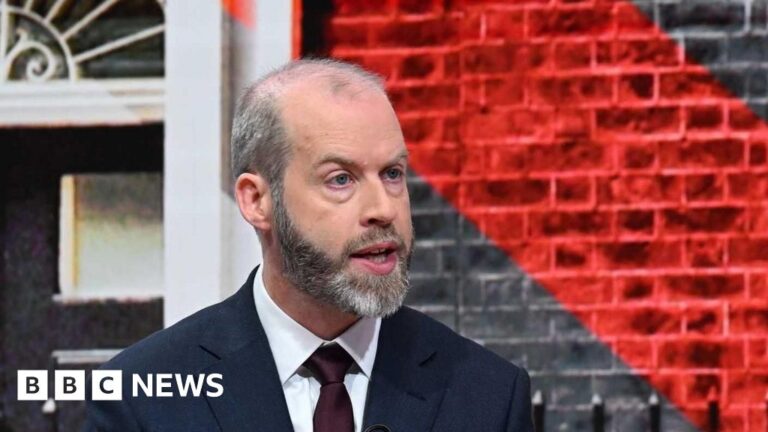- Author, Huw Thomas
- Role, Business Correspondent, BBC Wales News
-
The UK’s new business secretary has said “job guarantees” will form part of negotiations with steel giant Tata over its Port Talbot site.
Jonathan Reynolds said there was “a better deal available” on the future of the plant, but added that new technology would employ fewer people.
Mr Reynolds said he and Prime Minister Sir Keir Starmer had already spoken to Tata and were involved in active negotiations over the future of the Port Talbot plant.
Asked whether it would be possible to guarantee all jobs, he said: “Blast furnaces employ more people than some of the new technologies that are available.
“So there are a number of things you have to understand, but I absolutely agree that we have to make sure that this is a transition that works for workers and that they are part of it.”
Mr Reynolds said the government’s timetable for negotiations was “not very long”.
He said the Labour manifesto had promised £2.5 billion on top of the £500 million already agreed by the previous government.
“It is not about supporting loss-making companies, as we would have thought in the past in terms of industrial policy. It is about being a partner to invest in the future,” he said.
“There is more money available for the steel industry under our government plans, but it’s about making sure that we make that transition with the private sector together and recognising that we need to make sure that decarbonisation is not deindustrialisation and we need to do it together.
“But there is a better deal for Port Talbot and the steel industry as a whole, I’m sure.”
Glimmer of hope
The idea of future investment offers a glimmer of hope to those looking to mitigate the impact of Tata’s plans.
Labour had raised the possibility of supporting future investment in Port Talbot during the general election campaign, and Tata executives had been open to the idea.
But future investments will not save jobs in the short term. Even Tata Steel’s commitment to build an electric arc furnace next year will require far fewer workers than are currently employed in heavy blast furnace production.
Unite union general secretary Sharon Graham said the steel industry had been decimated.
She said there was a need for investment, job guarantees and public procurement legislation to ensure “all UK infrastructure projects use British steel”.
“We need to support British steel, we need to support British businesses – investment will be essential,” she told the BBC.
Rajesh Nair, director of Tata Steel UK, said he looked forward to working with the UK government to increase green steel production.
“We will work with the new ministers on our ambitious plans to invest and transform Port Talbot through electric arc furnace steelmaking, and to support our workers through this necessary but difficult transition,” he said earlier this week.
Image source, Getty Images
The company said operating the blast furnace was generating losses of £1 million a day and was not financially viable.
Tata has been in talks with unions since January, when the company unveiled plans to radically transform its operations to tackle financial losses and reduce carbon emissions.
Are you concerned by the issues addressed in this story?


